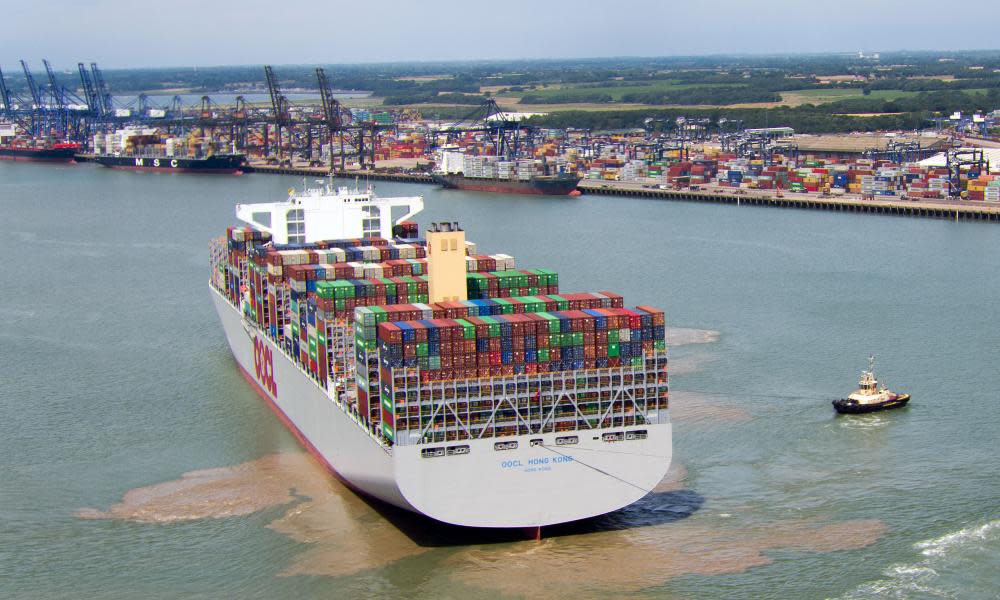Brexit economy: sterling fall hits public finances and fails to boost trade

The sharp fall in sterling triggered by the EU referendum result is having an adverse effect on Britain’s already weak public finances but has yet to bring about the expected improvement in the trade deficit, a Guardian analysis of the economic news of the past month shows.
In a period in which business confidence took a hit from the government’s loss of its overall majority in the general election, the Guardian’s monthly tracker found little evidence that the impact of a more competitive currency was offsetting a slowdown in consumer spending caused by dearer imports.
The latest data suggests the first official estimate of growth in the second quarter – due on Wednesday – will show a modest pickup from the 0.2% recorded in the first three months of 2017 but will not match the robust expansion recorded in the first six months after the Brexit vote.
Despite a weather-induced pickup in retail activity in June, consumer spending has been dampened by the failure of wages to keep pace with prices – a feature of the economy since the turn of the year.
There have been some signs over the past month that the effects of the post-Brexit referendum depreciation of the pound may soon start to fade. The annual inflation rate showed a surprise fall to 2.6% from 2.9%, helped by cheaper fuel prices, while industry’s fuel and raw material bills are rising by 10% a year rather than the 20% rate of increase seen at the turn of the year.
The pound started to fall against other currencies in the autumn of 2015 as financial markets started to factor in the possibility of the UK voting to leave the EU. By the time it reached its low point shortly after Theresa May raised the prospect at the Conservative party conference of Britain leaving without a deal, sterling had fallen by 22% against a basket of currencies. It has since risen by around 4% and is currently trading at just under $1.30 against the US dollar.
A weaker currency makes exports cheaper and imports dearer, but the latest set of official trade figures found that a rise in exports was accompanied by an even bigger increase in imports. In May, imports grew by 4.8%, almost double the 2.5% increase in exports, and, as a result, the UK trade deficit in goods widened by more than £1bn to £11.9bn.
David Blanchflower, a former member of the Bank of England’s monetary policy committee and professor of economics at Dartmouth College in the US, said: “Once again this month, there is only thin economic gruel in the data. The UK economy is continuing to be impacted by the fall in the pound post-Brexit, which has raised import prices, resulting in a temporary rise in inflation.”
To gauge the impact of the Brexit vote on a monthly basis, the Guardian has been tracking eight economic indicators, along with the value of the pound and the performance of the stock market. Unemployment beat economists’ expectations, falling to its lowest level since 1975, retail sales bounced back more strongly than anticipated as a result of the hot weather in June and inflation undershoot.
But surveys of business all showed slower growth, the trade deficit was bigger, earnings were weak and house price growth moderated.
The public finances were £2bn deeper in the red in June than in the same month of 2016 – with half the rise due to the higher debt interest on government borrowing caused by higher inflation.
The former Bank of England policy maker, Andrew Sentance, said he expected the second quarter growth figures to show the economy was expanding at a annual rate of just 1% in the first six months of the year.
“It is not hard to explain why the momentum of consumer spending has stalled so badly,” said Sentance, now a senior economic adviser at PricewaterhouseCoopers. “Real wages are now falling, even though inflation fell back to 2.6% in June. The main reason for the fall in inflation was the drop in the oil price, but it is still reasonable to expect inflation to rise above 3% later this year as the weakness of sterling continues to feed through to the prices paid by consumers.”
Chris Williamson, chief business economist at IHS Markit said: “With the economy showing signs of losing momentum and inflation showing a surprise fall to 2.6%, the latest data suggest that August could well see the Bank of England revise down its forecasts for the economy and put to bed the prospect of a rate hike any time soon, albeit with the door left open for a tightening of policy if the economic data surprise to the upside as we move through the second half of the year.
“However, given the recent disappointing flow of economic data, policymakers should perhaps acknowledge the risk that policy may need to be loosened to help the economy through this soft patch if conditions deteriorate further.”

 Yahoo News
Yahoo News 
